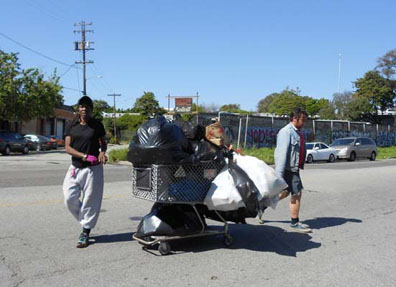by Larry A. Rosenthal
Dogtown Redemption is a visit to a streetscape many of us see but rarely inhabit, a narrative filled with tragic heroes, and with tales of personal transcendence. The film reveals a gritty urban reality just blocks away from where many of us live.
In our homes with their locking doors, we mindlessly throw recyclables into their appropriate receptacles. And then we collectively close our eyes and never follow where those throwaways go, and the lives they come to affect.
Viewing this fine documentary is medicine truly needed. We must constantly rethink how we come together to respond to social needs. In that sense, Dogtown Redemption serves as a harsh indictment; we are tolerating others living in conditions neither healthy nor sustainable.
Some of us know how to help those who can help themselves. But that knowledge fails many of our neediest neighbors. The movie brings in focus what many of us find hard to witness. And it rivets our attention, its story bounding into our now open hearts.
In the policy world, and in the nonprofit system providing services to the homeless, we too often fall victim to burnout, to the hypothetical treatment of populations rather than real immersion in the lives of individuals, to the abstraction of jobs and budgets as work in the face of poverty gets “professionalized.”
Like a siren call prescribed from on high, Dogtown Redemption grabs us, makes our work real, and connects us to the desperation we must profoundly confront, with renewed vigor and dedication.
The life trajectories of Miss Kay, Jason and Landon, the film’s three main subjects, characterize a human drama, but an economic one as well. So often our policy cultures fall victim to our own best intentions.
A robust transit system for recyclable goods was a visionary goal at the dawn of the environmental movement. Limiting the cost of that system, to maximize the conservation of resources and reduce the landfill-insult to our planet, was a universal objective.
Dogtown Redemption brings us face to face with what the success of that objective truly entails. It is not what our environmental leaders ever had in mind.
The rough and tumble of a recycling lifestyle isn’t for everyone. In Dogtown Redemption, we see the tender balance of folks dedicated to their independence, striking hard against their challenges to find self-sufficiency, but also trapped in a world of narrowed choices.

What on the surface looks like a private business becomes a kind of welfare office. There are no hidden treasures in that yard — just the physically punishing, day-to-day work of people pushing slow, heavily rolling burdens on the bumpy city streets and a small voucher in dollars and cents to show for all that toil.
We are made to think it is a profitable business for someone. The owner of the recycling yard — portrayed as a reasonable human being and a family man — bears the financial risk when the prices of materials change and global demand for recyclables shifts. But we also reckon with the reality that owners of businesses capture the spoils of others’ efforts.
The network of shopping carts is operated by “drivers” making only a subsistence wage, receiving no health care or other benefits, no sick leave or vacation, in constant competition with one another in what is a scavenging economy which takes all comers.
We are bound by twin perceptions — one, concerning the shameful necessities of this business; the other, a haunting thought that there may be no other way to make recycling work.
In the end, the economic opportunities the street’s scavengers enjoy are a poor excuse for a social assistance program.
We root for them to thrive at it, at the same time we pray they can escape from it.
Larry A. Rosenthal is an adjunct faculty in Public Policy, UC Berkeley, and Board President, Berkeley Food & Housing Project.
